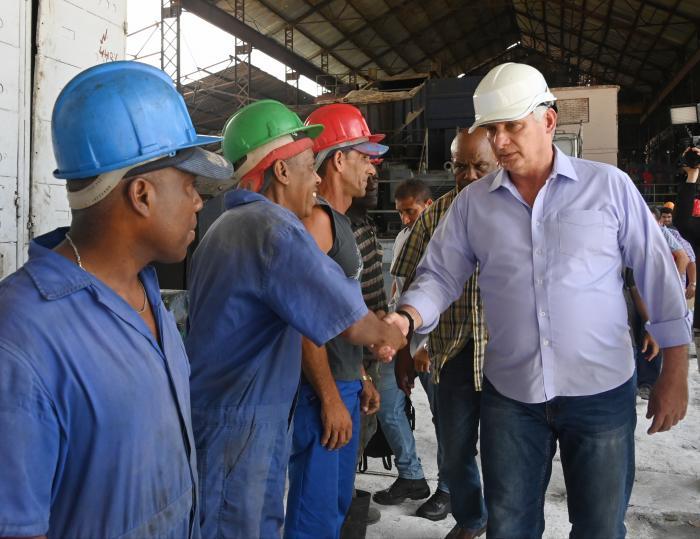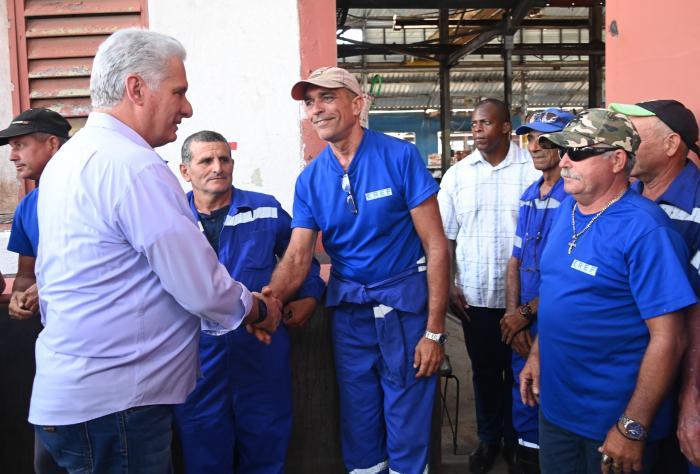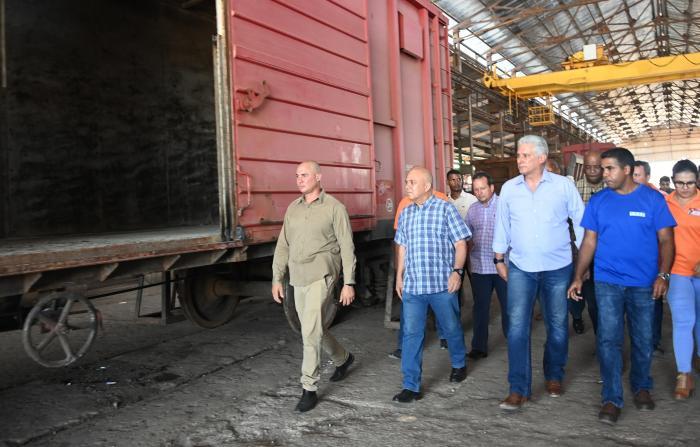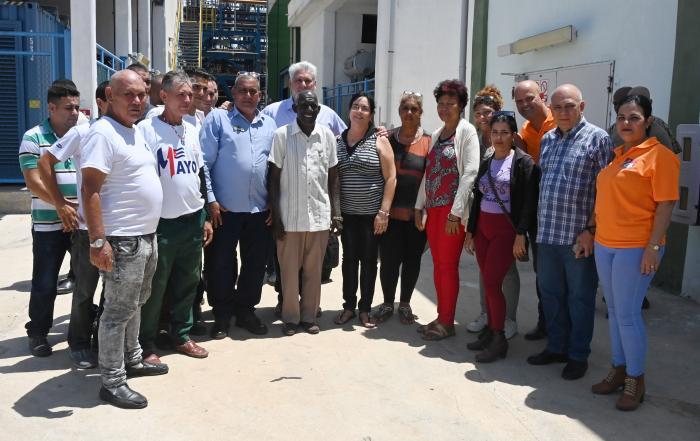
Many of Cuba's battles against the evils of difficulties are won with the formula of adapting thinking to the current times, of seeking new paths when, for various reasons, many other known paths have been closed.
Such a philosophy was born in the municipality of Sagua la Grande, in the province of Villa Clara, where the First Secretary of the Central Committee of the Communist Party and President of the Republic of Cuba, Miguel Díaz-Canel Bermúdez, arrived on Thursday afternoon as part of an itinerary initiated in 2024 - municipality by municipality and throughout the country - that seeks to have a first-hand look at different experiences and productive efforts aimed at moving the nation forward.
One of the places on the agenda of the Party leadership in the central area of the archipelago was the Electrochemical Company of Sagua (Elquim in Spanish), a producer of chlorine and its by-products destined for the national territory and the Caribbean, a region to which the factory has significantly increased its exports.
Accompanied by the member of the Political Bureau and Secretary of Organization of the Central Committee, Roberto Morales Ojeda, the Head of State inquired about the current state of the recently renovated technology and was informed that the plant does not suffer from chemical leaks, which has been noted with admiration by the visitors who usually come to the place, since there is no smell of substances coming from the production process.
Regarding the adaptation of the way of thinking to the times, the hosts explained that the company was not able to distribute profits because the expenses of the canteen were not low. Therefore, the option of self-consumption has become essential, and it will be a path that has already begun, since this decision, in its function of profit and granting autonomy, will be able to lighten the financial burdens of the plant.
The April 9th Railway Workshop (UEB), the last place on the afternoon's agenda, also illustrates how thinking can move: there, the president praised the new ways that the workers' collective, which has a high capacity for innovation, is resorting to. For example, they are currently working on converting Diana buses into ferrobuses.
Because the times demand it, the directors of the workshop have thought - and will do - to install a group of photovoltaic panels, which will be crucial in changing the energy matrix and will also be a possibility of offering electricity to other areas.
The afternoon of this itinerary-workshop began at the Héctor Rodríguez Power Plant, where the President was informed that the colossus was not meeting its production plan due to, among other things, a lack of fuel and lubricants, as well as adverse weather conditions.
When the President inquired about the future of the plant, the managers and workers committed themselves to continue milling as long as possible, adding 2,000 or 3,000 tons to the 7,000 tons already delivered.
In one of the meetings held on Thursday with children of Sagua la Grande, the President recalled that the possibility of getting out of difficult situations as soon as possible lies in the novelty, in the ingenuity to take paths that open the diapason for solutions.
THE ROAD TO SUCCESS WAS TO THINK AND DO EVERYTHING DIFFERENTLY
In the morning, Díaz-Canel and Morales Ojeda were in the municipality of Yaguajay, where the first stop was in the UEB Merida Dairy.
"This is a good example," said the President, after speaking with Ignacio González Más, director of the company, which in its beginnings produced only cheese and today boasts a range of a dozen products, although Mérida Cheese continues to be its signature product.
In a clean and orderly environment, where 173 Cubans not only work on valuable productions, but also radiate the efficiency of the UEB to the community, Ignacio said that the center has made it possible for the surrounding population to have guaranteed drinking water; and that the children of the school, the teachers and the family doctor eat lunch at the UEB.
"Imagine how much more they could do here with the profits they have," the President thought, when he learned that the production unit could not count on that money because the company to which it belongs, the Provincial Dairy, absorbs the profits.
"The inefficiency of the company swallows the efficiency of the UEB. These are some of the things that we have to change in the entrepreneurial thinking", ratified the Head of State.
Faced with a company that relies on self-consumption, with spaces for animal breeding, with the desire to own more land to increase production, the President returned to an idea that he usually shares in these times: Why, with the same blockade, why, with the same adversities, do some advance and others do not? The answer, as he has said on several occasions, is to be found in the management methods and the way in which the workers have been involved.
The same line of thought marked the arrival and the exchange in the UEB Santos Caraballé -belonging to the Venegas Livestock Company-, where the country’s administration was able to verify several achievements in the Vaquería Típica Dos, one of the 18 that this company has, of which ten have been recovered.
Before listening to the detailed explanation of César Liván Franco, director of the Livestock Company, the order and beauty of the place had already made the President say: "Here we have seen how we want to see cattle breeding". And his expression was based on the care in the signs, in the well-constructed fences, in a contemporary culture that the world of cattle breeding carries and demands.
In addition to the above, at the company level there are areas for self-consumption, areas where rice, vegetables and protein crops to feed the animals are grown. In this universe, the income is high, there are no bank arrears, there is communication with the university, there are warehouses for agricultural inputs, a veterinary clinic, beautiful houses are built for the cowboys... And all of this led Díaz-Canel to ask: "What is it wrong here?”
According to César Liván, last year there were more than 30 cases of theft and slaughter of cattle; in 2024 there will be only three. The steps in the right direction motivated the President to express: "Yes, we can get out of this mess. What is happening is that it has to be this way: working.”
When the President said to the executive that if they had remained indifferent, waiting for an import ship to come, they would not have achieved the success they have today, César Liván was categorical, in a clear allusion to the urgency of staying awake and not waiting for external forces: "It is forbidden to talk about it here."
The Mario Muñoz Polyclinic was the third point on the agenda of the visit, a place that serves nearly 10,000 people in the Venegas neighborhood. There are 16 family doctor's houses that are part of the health center and this important institution boasts, among other achievements, zero maternal mortality and zero infant mortality.
A few minutes before the start of the meeting that usually concludes the visit to each municipality, the Head of State informed the inhabitants of the Venegas neighborhood of his conviction that the largest of the Antilles can move forward with intelligence and hard work, and that after seeing the remarkable experiences of municipalities such as Yaguajay, it is unquestionable that those who succeed do so because they have done things in a different way, different from those who have not yet broken the inertia.


















